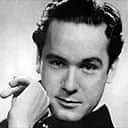In a career that flourished in the prewar period, before the advent of angry young men, Griffith Jones, who has died aged 97, used his gentle looks and debonair manners to play romantic heroes and sometimes sinister villains with equal charm. Despite the changing face of British theatre, he managed to extend his skill as an actor to be engaged on stage and screen for almost 70 years - retiring at the age of 90 - with the last 25 years spent happily playing minor roles at the Royal Shakespeare Company.
Born in London to a Welsh-speaking former lead miner and Londoner mother, he was the youngest of three boys who shared rooms above the family's dairy business in a district of the city where the police patrolled in threes. From the Polytechnic secondary school he won a scholarship to University College London to read law, and there he became involved in the university drama society. Sir Kenneth Barnes, the principal of Rada, offered him a place at the academy. He left university at the end of his first year to take it up and went on to become Rada's gold medallist in 1932.
He did not tell his parents of his career move, believing that they would surely not have approved. Indeed, when he did come clean, while performing in the West End in an adaptation of Evelyn Waugh's Vile Bodies (1932), his father disparagingly referred to him as a "chorus boy" - although his later success won the family round.
The 1930s were a busy period and the making of him. He plied smooth deception or noble manners in a string of West End performances including Sir John Montague in Richard of Bordeaux (1932), Weyland in Keith Winter's The Rats of Norway (1933) and Marco Polo in Eugene O'Neill's Marco Millions (1939). On his numerous appearances in other plays, the critic James Agate was prompted to praise his turning of bit roles, which on paper had nothing to offer, into performances of distinction without upstaging anyone. He was seldom, however, allowed to stray from upper-class social rectitude, playing toffs both in Arthur Watkyn's The Moonraker (1952) and Noel Coward's vehicle for the Lunts, Quadrille (1953-54) .
It was in the 1930s, too, that he played opposite Elizabeth Bergner in Margaret Kennedy's Escape Me Never - while working during the day on the Alexander Korda-produced film, The Rise of Catherine the Great (1934), in which he played Catherine's lover, Count Orlov. Escape Me Never played on Broadway, which was his New York debut, and was made into a film in 1935 with him resuming the role he had played on the stage, Caryl Sanger.
Other successful films followed and he played alongside such actors as Vivien Leigh in A Yank at Oxford (1938), Michael Redgrave in Sons of the Sea (1941), Robert Taylor and Glynis Johns in the comedy Miranda (1948), where he introduced a light touch in his performance about a man falling in love with a mermaid, and with Dirk Bogarde in The Sea Shall Not Have Them (1954)
Conscripted during the second world war, he spent his service in an army concert party called Stars in Battle Dress and was accompanied on the tours by his wife, Irene Isaac, known to everyone as Robin. Their daughter Gemma was born in 1942 and, after the war, his son Nicholas arrived while Griffith was appearing in Oscar Wilde's Lady Windermere's Fan at the Haymarket theatre for two years, earning him the moniker of Lord Darlington's baby. Both his children became actors.
Drama that promoted the kitchen sink or angry young men were not his forte (ironically, perhaps, for a London boy, he had become known for his work on upper-crust characters), but he took on John Osborne's Archie Rice in The Entertainer (1955) and later played the Count in the British premiere of Anouilh's The Cavern (1965) with his daughter as the kitchen maid. In 1973, he ventured into the new drama at Nottingham Playhouse as a crusty provincial councillor in Brassneck by David Hare and Howard Brenton and also as Baptista in The Taming of the Shrew.
It was shortly after this that he took the plunge with the RSC. He played, most affectingly, Duncan in Trevor Nunn's studio version of Macbeth (1977) with Ian McKellen and Judi Dench, and was the Ghost to Ben Kingsley's Hamlet in Buzz Goodbody's production (1975). And for the rest of his acting career he brought dignity, authority and unexpected humour to scores of Shakespearean, Dickensian and Chekhovian characters, directed by, among many others, Jonathan Miller, John Caird, Adrian Noble and Gregory Doran. The RSC became home for him and Robin in Stratford, London and Newcastle for 25 years.
He finally retired aged 90 and lived happily at home with Gemma and his cat, Hatty. He is survived by Gemma and Nicholas; Robin predeceased him.
· Griffith Jones, actor, born November 19 1909; died January 30 2007
